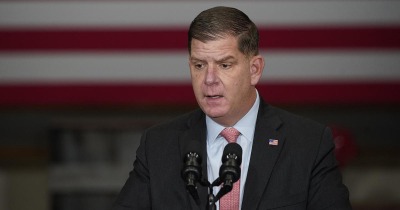
Legislative Updates – February 10, 2023
Labor Secretary Marty Walsh expected to resign
Multiple sources indicate Labor Secretary Marty Walsh will accept an offer to become the Executive Director of the National Hockey League Players Association (NHLPA). Sec. Walsh’s expected exit accelerated Washington’s parlor game of who will be the next DOL Secretary to a frenetic pace, with Deputy Labor Secretary Julie Su the front runner. AAPI Members of Congress are actively pressing the Administration to nominate Su, who, if confirmed, would become the first Asian American Cabinet Secretary of the Biden Administration. The Congressional Asian Pacific American Caucus endorsed Su on Wednesday. House Education & Workforce Ranking Member Bobby Scott (D-VA) said Su would be good and has done well so far.

Other names in the mix include former Member of Congress and DCCC Chair Sean Patrick Maloney, former Member of Congress Andy Levin (D-MI) who was an active supporter of workforce programming while in Congress, as well as current Member Donald Norcross (D-NJ). In such a narrowly divided Senate, any nominee will require an active effort by the Administration, as well as the support of the entire Senate Democratic Caucus, to be confirmed.
Senate HELP Committee holds its organizing meeting
New Senate HELP Committee Chair Bernie Sanders (I-VT) held the organizing meeting for the Committee on Thursday. He described how the Committee touches upon issues impacting nearly every American – and he wants to face issues impacting working Americans. Sanders outlined a host of key areas of focus, including addressing our broken health care system and stronger labor protections for workers. In the workforce arena, he described a joint interest with Ranking Member Bill Cassidy (R-LA) in expanding apprenticeship programming. He also would like to make improvements to the Older Americans Act.
Sen. Cassidy opened his remarks by highlighting how HELP Committee members do not always agree on the same course, there is a long history of bipartisanship. He would like to reauthorize a host of programs that have expired under the Committee’s jurisdiction and see how they can be refined. Sen. Cassidy noted how HEA has not been reauthorize since 2014 and WIOA’s authorization lapsed in 2020 and he would like to reauthorize both programs.
Sen. Cassidy also emphasized Republicans’ dismay over the Administration’s attempt to provide loan forgiveness, which he believes is unfair to noncollege educated workers who did not take out student loans and does not address the root cause of why postsecondary education is so expensive.
Other Members of the Committee were afforded the opportunity to highlight their priorities. Senator John Hickenlooper (D-CO) indicated he will continue to chair the Employment and Workplace Safety Subcommittee and is interested in preparing the 21st century workforce, rethinking how to approach workforce training, including an expansion of apprenticeship programs. Hickenlooper also mentioned his interest in early childhood education and improving literacy – which is also a priority of Sen. Cassidy’s.
The Committee holds its first hearing, entitled, “Examining Health Care Workforce Shortages: Where Do We Go From Here?” on Thursday, February 16.
House Education & Workforce Committee hearing on “Education in Crisis”
The House Education & Workforce Committee held its first hearing of the 118th Congress on the state of education in the U.S. The wide-ranging hearing touched upon highly partisan issues such as school choice and gender identity, as well as bipartisan support for expanding access for Pell recipients to short-term, high-quality training and credentials offered by workforce providers in high demand professions, along with the need to reauthorize and more strongly coordinate HEA and WIOA programming.
 Among the witnesses were Dr. Monty Sullivan, President of the Louisiana Community and Technical College System, who pressed for stronger integration between WIOA programming and Pell funding, as well as Governor Jared Polis (D-CO), whose testimony spanned from early childhood education to higher education, as well as workforce training. He called upon the Committee to reauthorize WIOA with stronger supportive services. Gov. Polis also noted his support for Registered Apprenticeship programs, highlighting CareerWise’s innovative youth apprenticeship program.
Among the witnesses were Dr. Monty Sullivan, President of the Louisiana Community and Technical College System, who pressed for stronger integration between WIOA programming and Pell funding, as well as Governor Jared Polis (D-CO), whose testimony spanned from early childhood education to higher education, as well as workforce training. He called upon the Committee to reauthorize WIOA with stronger supportive services. Gov. Polis also noted his support for Registered Apprenticeship programs, highlighting CareerWise’s innovative youth apprenticeship program.
Dr. Sullivan said short-term Pell was the single most important step Congress could take to address the nation’s skill shortage. Both Chair Virginia Foxx (R-NC) and Ranking Member Scott (D-VA) raised short-term Pell, with Ranking Member Scott citing the need to differentiate good programs from bad programs, while expressing optimism that a bipartisan agreement could be reached.
In his opening statement, Ranking Member Bobby Scott said Congressional Democrats plan to reintroduce legislation including the LOAN Act, WIOA, and the National Apprenticeship Act. Dr. Foxx described all education, whether for a credential, baccalaureate, or other degree granting programming, as education where participants gain skills leading to a career.
Our memo on the hearing is available here. Download the memo to utilize all hyperlinks.
House Agriculture Committee holds organizing meeting – discusses farm bill reauthorization and work requirements in SNAP
New Committee Chair Glenn Thompson (R-PA) indicated the top priority for the Committee will be reauthorizing the Farm Bill, which expires on September 30. One item of particular interest to the workforce community will be how Rep. Thompson approaches work requirements for SNAP participants. A group of conservative House Members sent a letter to the Administration seeking stronger work requirements. Currently, SNAP recipients must be involved in work related activities for 20 hours per week or their SNAP benefits are limited to three months total out of a three-year period.
Chair Thompson indicated he did not anticipate ramping up SNAP work requirements further and will seek to find a balance to garner bipartisan support for his bill. He will be focused on reducing the benefits cliff to help ease the transition for SNAP recipients to self-sufficiency.
House Ways & Means Committee holds it first in a series of hearings on UI fraud
Chair Jason Smith (R-MO) held a fractious hearing on pandemic unemployment insurance (UI) programming, the first in what he described as a series of hearings on UI fraud. Chair Smith solely invited GAO and Inspectors General from DOL and DOJ to participate in the hearing, which he stated was designed to attempt to capture the full scope of pandemic UI fraud.
DOL Inspector General Larry Turner increased his previous estimate of UI improper payments by $30 billion to $191 billion overall, $76 billion of which he estimated was fraudulent activity. GAO did not offer a precise estimate, but anticipates providing one later this summer.
While both parties agreed the CARES Act created an unprecedented opportunity for UI related fraud by allowing claimants to self-attest for their wages instead of providing states with documented wages, there was little other agreement between the parties. Republicans uniformly hammered Congressional Democrats for not holding oversight hearings and ignoring their recommendations for reducing fraudulent activities while in the minority and cast additional fault on DOL and the Biden Administration’s management of pandemic UI funding. Democrats rejected such criticism, pointing to much of the fraud occurring during the Trump administration. Instead, they highlighted how the overall benefits UI provided to millions out of work, far outweighing the cost of fraudulent or improper payments.
Our memo on the hearing is available here. Download the memo to utilize all hyperlinks.
Not a member? Join today.
Members of the American Workforce Coalition gain access to exclusive content and events, including:
- Monthly Jobs Reports
- Legislative Analyses
- Peer-to-Peer Collaboration
- Access to Experts & Innovators
Already a member? Login